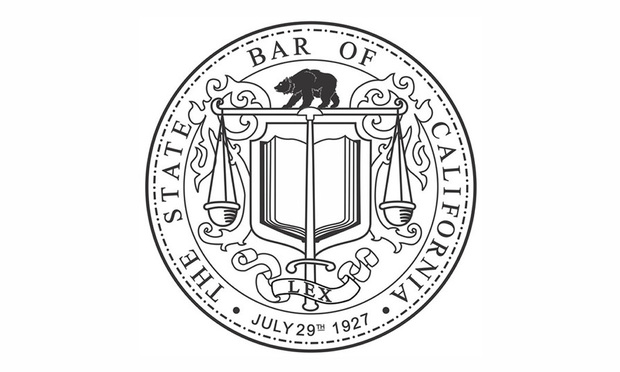California Bar Jumps Back Into the Regulatory Sandbox
"This is a significant step and I think it will lead to an exciting future," board chairman Alan Steinbrecher said.
May 14, 2020 at 06:56 PM
3 minute read
 State Bar of California's logo.
State Bar of California's logo.
California State Bar trustees on Thursday revived efforts to create a "regulatory sandbox" that could allow non-lawyers to develop legal services without violating professional rules governing the practice of law.
On a 9-2 vote, trustees agreed to form a working group that will consider relaxing rules barring the unauthorized practice of law, fee-sharing and non-lawyer firm ownership, all with an eye toward expanding affordable legal help.
"This is a significant step, and I think it will lead to an exciting future," board chairman Alan Steinbrecher said.
Other states, led by Utah, are pursuing regulatory changes to encourage non-lawyers to develop apps and services that could help close the legal gap between those who can afford to hire a lawyer and those who cannot. A state bar committee earlier this year had proposed that California follow the same course. But trustees in March put the brakes on such a study in California, citing "political headwinds" from lawyers and trade groups.
Following weeks of talks among bar leaders, attorneys, state lawmakers and Supreme Court representatives, a majority of trustees on Thursday rejected a compromise proposal that would have allowed the working group to study possible solutions to the legal gap but not changes to rules governing non-lawyer ownership of law firms. A majority of trustees said it wanted a full vetting of possible regulatory changes.
"We don't know what we don't know until we try it," said trustee Juan De La Cruz. "We tend to be very cautious. I'm not like that."
Trustees did not say who would serve on the group or when they might issue final recommendations.
"I'm very happy the board of trustees voted to continue work on the regulatory sandbox," said Bridget Gramme, administrative director of the Center for Public Interest Law. Gramme was a member of the Task Force on Access Through Innovation of Legal Services and co-authored a report supporting the regulatory sandbox concept. "It really shows that they're continuing to take a leadership role in that area."
Any regulatory changes will likely need the blessing of the California Supreme Court and the Legislature, a difficult challenge given that numerous legal groups, including the Consumer Attorneys of California and Public Counsel remain opposed.
Micha Star Liberty, a former state bar board member and current president of the Consumer Attorneys, said the sandbox proposal raises "huge ethical problem[s] without really increasing access to justice."
"I don't think there is a solid enough appreciation for the political requirements to get the Business & Professions codes changed," Liberty said. "There's also a fundamental and profound misunderstanding about the process and the political will to do that."
This content has been archived. It is available through our partners, LexisNexis® and Bloomberg Law.
To view this content, please continue to their sites.
Not a Lexis Subscriber?
Subscribe Now
Not a Bloomberg Law Subscriber?
Subscribe Now
NOT FOR REPRINT
© 2025 ALM Global, LLC, All Rights Reserved. Request academic re-use from www.copyright.com. All other uses, submit a request to [email protected]. For more information visit Asset & Logo Licensing.
You Might Like
View All

Cleary Nabs Public Company Advisory Practice Head From Orrick in San Francisco

The Rise of Female Breadwinners: Challenging Traditional Divorce Dynamics
4 minute read
An Overview of Proposed Changes to the Federal Rules of Procedure Relating to the Expansion of Remote Trial Testimony
15 minute readTrending Stories
Who Got The Work
J. Brugh Lower of Gibbons has entered an appearance for industrial equipment supplier Devco Corporation in a pending trademark infringement lawsuit. The suit, accusing the defendant of selling knock-off Graco products, was filed Dec. 18 in New Jersey District Court by Rivkin Radler on behalf of Graco Inc. and Graco Minnesota. The case, assigned to U.S. District Judge Zahid N. Quraishi, is 3:24-cv-11294, Graco Inc. et al v. Devco Corporation.
Who Got The Work
Rebecca Maller-Stein and Kent A. Yalowitz of Arnold & Porter Kaye Scholer have entered their appearances for Hanaco Venture Capital and its executives, Lior Prosor and David Frankel, in a pending securities lawsuit. The action, filed on Dec. 24 in New York Southern District Court by Zell, Aron & Co. on behalf of Goldeneye Advisors, accuses the defendants of negligently and fraudulently managing the plaintiff's $1 million investment. The case, assigned to U.S. District Judge Vernon S. Broderick, is 1:24-cv-09918, Goldeneye Advisors, LLC v. Hanaco Venture Capital, Ltd. et al.
Who Got The Work
Attorneys from A&O Shearman has stepped in as defense counsel for Toronto-Dominion Bank and other defendants in a pending securities class action. The suit, filed Dec. 11 in New York Southern District Court by Bleichmar Fonti & Auld, accuses the defendants of concealing the bank's 'pervasive' deficiencies in regards to its compliance with the Bank Secrecy Act and the quality of its anti-money laundering controls. The case, assigned to U.S. District Judge Arun Subramanian, is 1:24-cv-09445, Gonzalez v. The Toronto-Dominion Bank et al.
Who Got The Work
Crown Castle International, a Pennsylvania company providing shared communications infrastructure, has turned to Luke D. Wolf of Gordon Rees Scully Mansukhani to fend off a pending breach-of-contract lawsuit. The court action, filed Nov. 25 in Michigan Eastern District Court by Hooper Hathaway PC on behalf of The Town Residences LLC, accuses Crown Castle of failing to transfer approximately $30,000 in utility payments from T-Mobile in breach of a roof-top lease and assignment agreement. The case, assigned to U.S. District Judge Susan K. Declercq, is 2:24-cv-13131, The Town Residences LLC v. T-Mobile US, Inc. et al.
Who Got The Work
Wilfred P. Coronato and Daniel M. Schwartz of McCarter & English have stepped in as defense counsel to Electrolux Home Products Inc. in a pending product liability lawsuit. The court action, filed Nov. 26 in New York Eastern District Court by Poulos Lopiccolo PC and Nagel Rice LLP on behalf of David Stern, alleges that the defendant's refrigerators’ drawers and shelving repeatedly break and fall apart within months after purchase. The case, assigned to U.S. District Judge Joan M. Azrack, is 2:24-cv-08204, Stern v. Electrolux Home Products, Inc.
Featured Firms
Law Offices of Gary Martin Hays & Associates, P.C.
(470) 294-1674
Law Offices of Mark E. Salomone
(857) 444-6468
Smith & Hassler
(713) 739-1250






